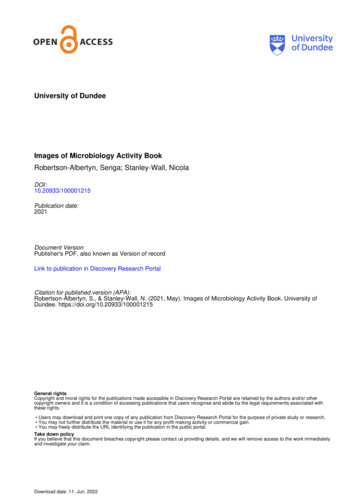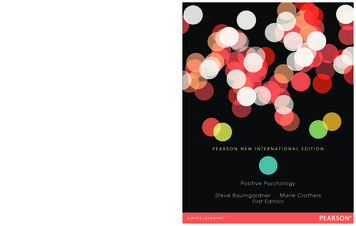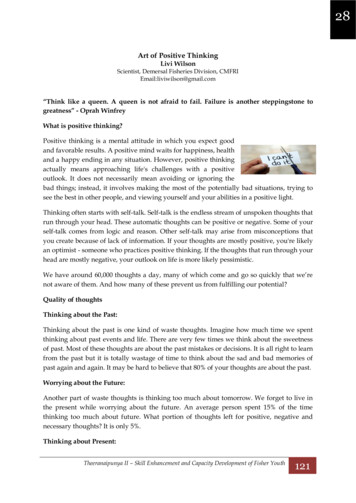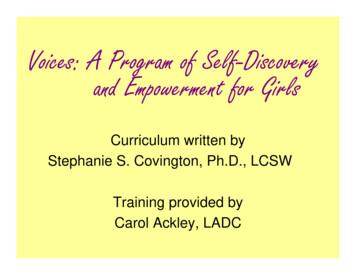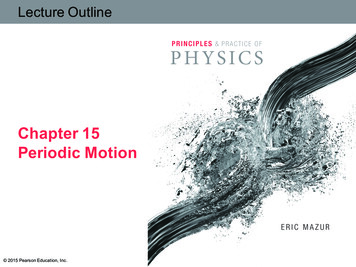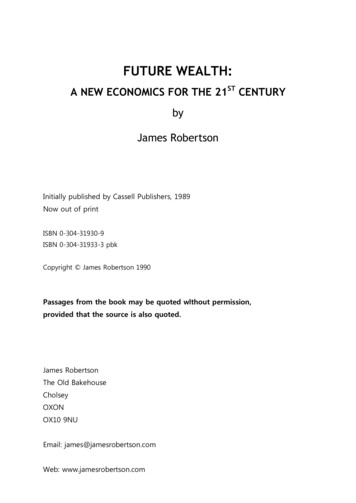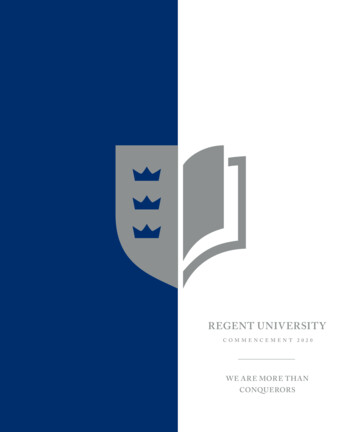
Transcription
Robertson, P.J. (2017). Positive psychology and career development. British Journal ofGuidance and Counselling [forthcoming].This is a pre-publication version of this article, accepted for publication but prior to copyediting. If possible please access the final published version.
Positive Psychology and Career DevelopmentPeter J. RobertsonEdinburgh Napier UniversityEdinburgh Napier University,School of Applied Sciences,Sighthill Campus,Edinburgh EH11 4BN.p.robertson@napier.ac.ukAbstractPositive psychology has been an influential movement within psychology in the early yearsof the 21st century. It is now timely to assess the value of its contribution to career educationand guidance. This paper provides a critique of this perspective. Positive psychology canenrich approaches to career development. It can provide a fertile source of concepts and anempirical basis for some elements of practice. However the application of approachesderived from positive psychology is problematic if it neglects the socio-economic context inwhich careers are lived and experienced, or if claims are made for its efficacy cannot besupported by the evidence base.Key words: Career development; positive psychology; well-beingIntroductionPositive psychology is best understood not as a sub-discipline or specialism, but rather as amovement to change the nature of psychology. It aims to rebalance the discipline bycounteracting the bias towards pathology and dysfunction (Seligman & Csikszentmihalyi,2000). Psychology’s focus on negative experience certainly applies in the employmentdomain: stress persists as a major preoccupation in work psychology (e.g. Graham, Howard& Dougall, 2012). Positive psychology brings to the table a focus on healthy functioning,positive experiences and well-being. Linley, Harrington & Garcea (2010) call for a moveaway from a deficit approach to problem solving at work towards an ‘abundance approach’that highlights human potential. Rath & Harter (2010) take the link between positiveexperiences and working lives a step further. Drawing on extensive survey research by the
Gallup organisation, they identified career as one of five key elements to well-being (alongwith social, financial, physical and community well-being). Locating career experiences ascentral to building a good life is a position that career scholars might find appealing. There isalso reason to believe that positive experience at work has wider health benefits. Persuasiveevidence indicates a positive relationship between job satisfaction, and more global measuresof life satisfaction and health (Erdogan, Bauer, Truxillo & Mansfield, 2012; Faragher, Cass& Cooper, 2005).A key feature of the positive psychology movement is that its focus on promoting positivewell-being is of relevance to the whole population. Counselling applications derived from itlend themselves to non-clinical settings, and now form one of the key conceptualunderpinnings to coaching psychology practice (e.g. Boniwell, Kaufmann & Silberman,2014; Linley & Harrington, 2007). Thus techniques derived from positive psychology maybe a comfortable cultural fit with career counselling or coaching. The focus is on promotingeffective functioning; not on the management of symptoms or distress. This has encouragedsome, notably Jacobsen (2010) and Yates (2013a) to explore the value of applying positivepsychology to career counselling.This paper will further explore this area. First selected contributions of positive psychologyto career development will be highlighted, then limitations and weaknesses of the movementwill be outlined, with a view to finally providing a balanced assessment of its contribution tocareer guidance and development.Contributions from Positive PsychologyThis section will highlight some of the important themes emerging from positive psychologythat provide insights of potential value to career development practice and research.Concepts of well-being: hedonia and eudaimoniaPositive psychologists make distinctions between different kinds of well-being. Thedichotomy between hedonia and eudaimonia (e.g. Deci & Ryan, 2008; Ryff & Singer, 2008)is a useful distinction when considering well-being at work (Straume & Vittersø, 2012).Hedonia relates to happiness in the sense of positive mood and pleasure, but it is eudaimoniathat is more obviously relevant to the study of careers. Eudaimonia encompasses ideas such
as engaging in purposeful or pro-social activity, fulfilling one’s true nature, and effectivefunctioning. Whilst hedonic experiences may come and go, eudaimonia suggests a focus onlifestyles that promote a more sustainable kind of well-being and a meaningful life (Ryan,Huta & Deci, 2008). Work seems unlikely to provide passive hedonic pleasure; access toabsorbing activities, healthy relationships and opportunities for personal growth seems moreplausible. So career development might be understood as an activity with eudaimonic wellbeing as its ultimate goal.It would be premature to discard hedonic well-being entirely. It is the focus of Fredrickson’s(2005) ‘broaden and build’ theory of positive emotion. This perspective does not see positiveemotion as an end in itself. Rather sees it positive emotion as promoting playful exploration,which in turn leads to a virtuous circle of learning and growth, leading to long term benefitsincluding more positive emotion (Boniwell, Kaufman & Silberman, 2014). The broaden andbuild theory is now well supported by empirical evidence (Garland et al 2010), whichindicates that positive emotions have short term effects on broadening thinking and attention,and longer term effects in building personal coping resources and positive feelings.Frederickson’s approach to the ‘seeding’ of positivity is advocated by Jacobsen (2010) foruse in career counselling. Whilst early approaches to vocational guidance placed clients in apassive role, many contemporary perspectives on career learning advocate promotion ofproactive behaviour and research (e.g. Krumboltz, 1996; McCash, 2006; Taviera & Moreno,2003). Arguably these activities are facilitated by an open and positive state of mind. Indeedthe ‘Planned Happenstance’ approach to career counselling (Mitchell, Levin & Krumboltz,1999) recommends encouraging curiosity and even playful exploration in clients. ThusFrederickson’s thinking may help to provide a starting point for understanding the necessaryemotional pre-conditions for career exploration to be effective.Flow and interestsCsikszentmihalyi’s (2002) concept of ‘flow’ is of direct relevance to careers. Flow is relatedto the more familiar concept of interests (e.g. Closs, 1993), but it is more specific, referring tothe state of being completely absorbed in an activity. This experience is often associated withlosing both a sense of self, and a sense of the passage of time. Flow experiences are a kind oftransient well-being, but more importantly can have a positive influence on the rest of thelife-space. Flow experiences are more common at work rather than home, because the
environment provides clear goals, challenges, and demands concentration (Seligman, 2002).Dik and Hanson (2008) provide an in-depth exploration of the link between interests, careersand well-being. They argue that transient emotional experiences of interest can grow into anenduring disposition that underpins meaningful work and facilitates eudaimonic well-being.Vocational interests are well established focus for career counselling, and continue to betaken seriously as a topic of study (e.g. Savickas & Spokane, 1999; Silvia, 2006; Dik &Hansen, 2008). Interest inventories have advantages over other kinds of assessment tools(such as cognitive ability, personality, or learning styles) as they relate so directly tooccupational choice. The links established by positive psychologists between flow and wellbeing can only strengthen confidence in the use of interests as a central concept in careerswork. Further support comes from Henderson’s (2000) small scale qualitative study ofindividuals selected for their strong career happiness. These individuals displayed anenduring commitment to follow their interests: those areas that they succeeded in andenjoyed.Meaning in careers and the concept of a ‘calling’Some positive psychologists have gone some way beyond a focus on interests by suggestingpeople should pursue a ‘calling’ in life, using a religious metaphor for occupational choiceand persistence in a line of work (e.g. Steger & Dik, 2009; Harzer & Ruch, 2012). Thisconcept is a recurring theme in applications of positive psychology to work (Mills, Fleck &Kozikowski, 2013). The work of Wrzesniewski (e.g. 2003; 2012) seems to have beeninfluential in the field. Calling relates to a eudaimonic conception of well-being. There areproblems of definition here (Hirschi, 2011), for example a calling may require an externalquasi-spiritual summons or alternatively may arise from internal reflection. Another issue iswhether calling necessarily means an altruistic and pro-social career path. Acknowledgingdiversity in definitions and approaches to measurement, Dik & Duffy (2013) summariseresearch in the field, and report evidence for a relationship between having a calling and lifesatisfaction, an important well-being variable.Explorations of calling are one facet of a wider trend in positive psychology to exploremeaning in work (e.g. Steger & Dik, 2010; Schnell, Höge & Pollett, 2013). Dik et al (2015)point out the value of a systematic and explicit focus on meaning as an important conceptwhich is implicit throughout theories of vocational choice and career development. Dik,
Duffy & Eldridge (2009) recommend career counsellors assess the relevance of calling toindividuals, promote an active approach to seeking meaning at work, and incorporate aspiritual dimension to their guidance.Career successThe study of career success represents one lens through which to view the relationshipbetween positive experiences and careers. A useful distinction can be made betweenobjective and subjective career success (e.g. Poole, Langan-Fox and Omodei, 1993; Ng, Eby,Sorensen & Feldman, 2005; Abele& Spurk, 2009). In this context, objective success refers toindicators such as pay and hierarchical status, whereas subjective success refers to anindividual’s evaluation of their own career, and it is the latter that is of most interest here.One interesting finding to emerge in this field suggests that rather than happiness being aconsequence of career success, in fact the reverse may be true. At least to some extenthappiness precedes and facilitates success in the work context. A review of 225 sourcesexploring the links between success and happiness, found that happiness often led tosuccessful outcomes rather than following on from them (Lyubomirsky, King & Diener,2005). Similarly, Boehm & Lyubomirsky (2008) reviewed cross-sectional, longitudinal andexperimental evidence on the effects of positive affect on a variety of work related variables.They concluded that happiness is not just associated with career success but it also precedessuccess and positive work outcomes. Some support for this position comes from a metaanalysis of the relationship between job satisfaction and subjective well-being by Bowling,Eschleman & Wang (2010). In addition to identifying a relationship they found thatlongitudinal studies indicated that subjective well-being was stronger determinant of jobsatisfaction than vice versa. This evidence is both counter-intuitive and valuable, as itsuggests career related benefits may follow from broader based happiness interventions.There are strong parallels with Fredrickson’s (2005) ‘broaden and build’ theory here.Jacobsen (2010) suggests that when clients come to career counsellors seeking the right job tomake them happy, they have got it back to front. She claims that approaches to promotepositive well-being can be used in career counselling and will in the long run tend to promotecareer success. A longitudinal study in both USA and Germany by Haase, Poulin &Heckhausen (2012) provides relevant evidence. They found that striving for career andeducational goals was predicted by positive affect.
StrengthsThere are reasons to believe that character strengths are relevant to career development. Forexample, Littman-Ovadia & Davidovitch (2010) found that the deployment of strengths wasrelated to personal well-being and job satisfaction, and was complementary to congruencebetween academic studies and choice of occupation. Lopez, Snyder & Rasmussen (2003)suggest there is a need to strike a balance between the assessment of human weaknesses andstrengths. They argue the assessment of positive characteristics has applications incounselling and rehabilitation psychology. They stress that strengths are as real asweaknesses although they have received less attention. Snyder et al. (2003) take thisargument a stage further by suggestion that the act of naming and labelling a positivecharacteristic (and subsequently measuring it) in itself sends a powerful message to a serviceuser that it is something of importance.Thus positive assessment tools may bring something distinctive to a career education andguidance setting. These include ‘StrengthsQuest’ (Clifton, Anderson & Schreiner, 2006),which focuses on identifying and building on talents and abilities. The most influential toolis the ‘Values in Action Institute Inventory of Strengths’ (VAI-IS: Peterson & Seligman,2004), a character strength assessment with evidence of rigorous psychometric development(Park & Peterson, 2007). It represents an attempt to answer Seligman’s call to identify whatis right with people, in contrast to the clinician’s preoccupation with diagnosing what iswrong with them. In this model, character strengths are classified into six main groups:wisdom and knowledge; courage; humanity; justice; temperance; and transcendence. Each ofthese is further subdivided into between three and five character strengths (e.g. justicesubdivides into fairness, leadership, and teamwork). Some strengths may have more genericvalue in the workplace, for example Littman-Ovadia & Lavy (2016) identify perseverance asa key indicator of work performance, and likely to be necessary to sustain successful careersin the long term. In common with occupational interest inventories, strength assessments areunthreatening to feedback, an appealing feature in tools used for development purposes.The focus on positive strengths may boost self-esteem, whilst reducing resistance to change,and motivating action. Strengths assessments cannot offer precise occupationalrecommendations, but career choices will tend to involve capitalising on available strengths
and resources (Klimka & Budzińska, 2015; Yates, 2013b). Once their ‘signature strengths’are identified, clients can be encouraged to practice using them and to seek novel situationsand ways to deploy them. Dik et al (2015) claim that the development of strengths promoteswell-being in the work context, and is associated with experiencing work as meaningful. Inthe UK, Linley & Harrington (2006; 2007) have been involved in adapting these assessmentsfor workplace application.Littman-Ovadia, Lazar-Butbul & Benjamin (2014) developed a protocol for strengths basedcareer counselling and tested it in comparison to a more standard career counselling approachwith an unemployed group. They found the strengths based intervention produced better selfesteem outcomes, and satisfaction with the counselling process. Owens, Moti & Krieshok(2015) were more equivocal. Working with college students, they compared theeffectiveness of careers intervention based around interest assessment with an interventionbased around strengths assessment, and with both in combination. The combined approachproduced the best results across a range of outcomes including career decision making selfefficacy, but only marginal benefits above the interest based intervention.Career interventions and outcomesMagyar-Moe, Owens & Scheel (2015) suggest that the counselling literature embraces thepractice of developing strengths rather more readily than the empiricism that underpins it.Thus a distinction might need to be drawn between interventions inspired by applications ofpositive psychology, and the use of positive outcomes in research and evaluation studies. Agood example of the former is provided by Zikic & Franklin (2010) who describe a holisticcareer counselling framework that is inspired by constructivism and positive psychology.Narrative approaches are used to focus on valued experiences, so as to generate positiveaffect and identify strengths. Whilst no rigorous evidence of effectiveness is presented, thisillustrates how positive psychology can inspire holistic and hybrid approaches to innovativecareer counselling practice.There is evidence for the effectiveness of positive counselling or coaching techniques, but itis not unambiguously persuasive. Mongrain & Anselmo-Matthews (2012) replicated aninfluential study by Seligman et al. (2005) examining the effectiveness of two techniques:‘Three good things’ (a gratitude activity); and ‘Using your signature strengths in a new way’.
They found some enduring improvements in happiness but more modest effect sizes than theoriginal study, and by improving the control group conditions, they were able to demonstratethe techniques had no specific therapeutic efficacy beyond encouraging positive self-relevantinformation.Robertson (2013) explored the use of well-being as an outcome of interest in career guidanceresearch, and made a case for its potential value. Preskill & Donaldson (2008) provide agood example of how drawing on ideas from positive psychology can inform the challengingand often neglected task of evaluating career development. From a human resourcesmanagement (HRM) perspective, they outline an innovative approach to evaluating a careerdevelopment intervention. They used ‘appreciative inquiry’, a participative organisationalresearch method, which pre-dates the positive psychology movement but now incorporatesstrengths based approaches (e.g. Cooperrider, Whitney & Stavros, 2008). With this approachthey were able to assess the effectiveness of a mentoring programme for women.Another example relates not just to a different context but also a very different approach.Peng (2015) successfully used a strengths based career education programme ‘infused’ withspirituality to reduce state anxiety in Taiwanese students. Acknowledging the links betweenlife-design and resilience in contemporary career thinking, Peng sees career counselling as away to combat contemporary stresses faced by students.Limitations and weaknessesPositively psychology has attracted critics, and their contributions have met with rebuttalsfrom its advocates. This section introduces the main criticisms, drawing extensively on thework of Davies (2015), Ehrenreich (2009), Fineman (2006), Hackman (2009), Held (2004),Lazarus (2003), Magyar-Moe, Owens & Conoley (2015), Power (2016), Schneider (2011),van Deurzen (2009), and Warren (2010). There is considerable overlap in the objections theyraise, so the aim here is to integrate and summarise this material, while contextualising thecritique to the career development field.Old wine in new bottlesThe study of healthy functioning pre-dates the positive psychology movement. This isevident in the humanistic psychology of the mid-20th century (e.g. Maslow, 1970). This isperhaps the least persuasive of the criticisms as positive psychologists are explicit about the
earlier traditions that they build on. Joseph (2015) highlights the synergy between positivepsychology and person centred psychotherapy derived from the work of Carl Rogers. Forhim the promotion of effective functioning, going beyond dealing with dysfunction, wasalways the core purpose of counselling. The counsellor attitudes and skills derived fromperson centred approaches are a foundation for career guidance, and many other counsellingapplications. More generally, some UK counselling psychologists have recently argued thatpositive psychology can help their profession resist the encroachment of a medical model ontheir practice, and reconnect with their original project to promote human flourishing, andpositive well-being. Such a development might bring coaching psychology, counsellingpsychology and career counselling closer together, in a way consistent with the sharedhistorical roots and values of these practices (Grant & Palmer, 2015; Robertson, 2015;Steffen, Vossler & Joseph, 2015).In spite of a relative neglect of an explicit focus on subjective well-being in career theory andpractice, positive psychology appears to have great resonance with the pre-existing careerdevelopment literature. Eggerth (2008), Juntunen & Wettersten (2006), Robitscheck &Woodson (2006) all point to the synergy between vocational psychology and positivepsychology, in the shared focus on promoting effective functioning in the work and educationdomains. Savickas (2008) in particular, has argued that vocational psychology was alreadypromoting positive functioning before the arrival of positive psychology. Hartung & Taber(2008) point to the substantial literature on work adjustment and job satisfaction, representinga wealth of evidence related to the promotion of positive health and well-being.Positive psychology as ‘positive thinking’Positive psychology has been accused of naïve ‘Pollyanna’ positivity, a view that is rejectedby its advocates (Diener, 2003). Whilst positive psychologists seek to distance theirevidence based work from earlier populist notions of positive thinking (e.g. Peterson, 2009),they routinely present happiness as an attainable goal, and by implication as a reasonableexpectation. But happiness as an emotion is fleeting and not readily captured. Kidd (1998),in her discussion of the neglect of emotion in the study of career, acknowledges its transientnature.The valorisation of happiness in positive psychology implies that the negative emotions mustbe avoided. The critics argue that bad feelings have important adaptive functions, and are
essential to a healthy personality. Negative emotions can lead to positive outcomes (Norem& Chang, 2002). For example anxiety or pessimism can provoke prudent caution. Converselypositive emotions may sometimes be dysfunctional, as in the case of excessive optimismleading to risky or delusional behaviour. Emotions occur within a context, and relentlesscheerfulness may be neither appropriate nor desirable in a well-integrated adult. A relatedissue is the political function of negative emotion: it can lead to demands for social andeconomic reform (such as industrial action) and this may be better in the long run than apsychological palliative.Positive psychology as healingWhilst decrying the preoccupation with human deficits, the positive psychology movementsubtly reinforces it. It has been quick to embed itself within not just counselling, but also thepopular self-help and self-improvement literature. In urging people to experience positiveemotions, it implies that we are sub-optimal beings if we fail to do so. The absence ofhappiness becomes a deficit that requires a ‘fix’. If the remedy fails, then individuals mustlook to their own failure to follow the guidelines assiduously enough. It also locates positivepsychology within a well-established ‘happiness industry’, with products to sell.Positive psychology is viewed by some critics as part of a wider social trend towardsemotional demonstrativeness, confessional self-disclosure, and a therapeutic colonisation ofeveryday life (e.g. Ecclestone & Hayes, 2008). Positive psychologists (e.g. Seligman &Csikszentmihalyi, 2000) have been at pains to distance themselves from the individualismand narcissism of the self-help movement, and point to their evidence base as a keydistinguishing feature.Positive psychology as a capitalist projectThere is another way in which the movement is commercial in its nature, and one thatbecomes apparent in ‘positive organisational scholarship’, a label recently attached toworkplace applications of positive psychology. This literature is preoccupied with improvingworker productivity. Worker well-being is a concern, but a secondary one, assumed to be in awin-win correlation with productivity (e.g. Harter, Schmidt & Keyes, 2002; Diener et al.,2009). Independent reviews of the evidence linking well-being related variables toproductivity tend to be more cautious and equivocal (e.g. Cropanza & Wright, 2001;Shackleton, 2012). Positive organisational scholarship seems to be primarily for the benefit of
the employer. The literature ignores potential conflict of interest between different actors inthe labour market. It identifies the worker’s positive emotions as a motivational resource tobe activated and deployed. In the light of this perspective, notions such as ‘calling’ becomeproblematic, because a radical critique might suggest that persuading an employee that theirmundane work has a higher meaning is potentially a way of extracting greater labour for nogreater cost. This is described as the ‘dark side’ of calling by Duffy & Dik (2013). Itresonates with a wider movement towards the commercial use of employee feelings, bestillustrated by Hochschild’s (1983) influential book, ‘The managed heart: thecommercialisation of human feeling’, in which the notion of emotional labour is outlined.Positive psychology as an ethno-centric cultural movementAll movements need to be understood in terms of their cultural roots. Positive psychologyemerged in the USA at the end of the 20th century. More than an academic activity withinone discipline, it is a wider cultural movement. It is not value neutral (Cameron, Dutton &Quinn, 2003). An evangelical style is evident in the popular positive psychology texts (e.g.Seligman, 2002). Seligman (2002) proposes that positive psychology needs to link tospirituality. As Harris, Thoresen & Lopez (2007) point out, there are complexities in drawingreligious and spirituality in positive counselling. Sheldon & Lyubomirsky present empiricalevidence that hard work is the best route to achieving sustainable happiness, something theydescribe as “ consistent with the Puritan version of the American dream” (2006, p 82, theiritalics). Indeed, the ‘pursuit of happiness’ is explicit in the Declaration of Independence(Jefferson, 1776). Relatively more sceptical and secular European audiences may be cautiousabout adopting a world view rooted in American social, economic, spiritual and culturalassumptions. This argument must not be overstated as it could represent a negativestereotypical caricature. It is important to note that some positive psychologists, notablyBiswas-Diener (e.g. 2006), have sought to address these concerns by developing aninternational and multi-cultural empirical evidence base.Positive psychology and unemploymentThe unemployed are potentially exposed to greater threats to their mental well-being thanthose in work (Waddell & Burton, 2006). The economist Lord Layard has been a leadingadvocate of the importance of the public mental health perspective that positive psychologistshave highlighted (e.g. Layard, 2005). Recognising both the costs to society and individual
distress associated with unemployment, he was influential in encouraging the adoption ofevidence based psycho-therapeutic interventions in welfare-to-work settings in the UK.However well intentioned, the resulting attempts to ‘fix’ unemployed people’s emotionswhile leaving their socio-economic situation unchanged has attracted fierce criticism, forexample:The context in which positive psychology's motivational techniques are deployed, then, is onestructured by a regime of tacit and explicit threat and coercion, in which one can never besure whether or not a sanction will be tagged to a particular instance of behaviour or attitude.As many first-hand accounts witness, Jobcentres and the premises of welfare-to-workcontractors are not neutral settings for interventions or decisions about the relative degree ofunemployed people's material hardship, ‘willingness to work’, ‘readiness’ for work or‘resistance’ to work: they are intensely anxiety-inducing and intimidating locations that bearwitness to marked imbalances of power.(Friedli & Stearn, 2015, p45).This illustrates the potential difficulty in translating psychological interventions that areintended to be empowering into contexts where political and economic factors can distorttheir noble goals. In practice the techniques used in such settings are often derived fromother psychological traditions, notably cognitive-behavioural therapy (CBT) (e.g. Proudfoot,Guest, Carson, Dunn & Gray, 1997; Kellett, Purdie, Bickerstaffe, Hopper, & Scott, 2013).Nonetheless, the underpinning rationale used by Layard (2005) and described in the exampleabove is clearly rooted in positive psychology. By making access to welfare benefitsconditional on participation in quasi-therapeutic activities, the meaning of these interventionsis fundamentally changed. Whilst intended to ameliorate the psychological detrimentsexperienced by the unemployed, they risk the perverse consequence of reinforcing a coercivelabour activation agenda.Constructs and approaches to measurementPositive psychology is firmly rooted in mainstream empirical psychology and has rapidlyamassed a large evidence base, and this foundation is central to its credibility. Mills, Fleck &Kozikowski (2013) in their review of positive organisational scholarship, described thisemerging literature as fragmented. They provide a review of constructs used, which includeresilience, empowerment, gratitude, psychological capital, employee engagement, perceivedsupport, positive teamwork, and positive leadership. To this we can add key happinessconstructs such as positive affect and life satisfaction
A key feature of the positive psychology movement is that its focus on promoting positive well-being is of relevance to the whole population. Counselling applications derived from it lend themselves to non-clinical settings, and now form one of the key conceptual underpinnings to coaching psychology practice (e.g. Boniwell, Kaufmann & Silberman,
